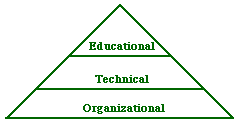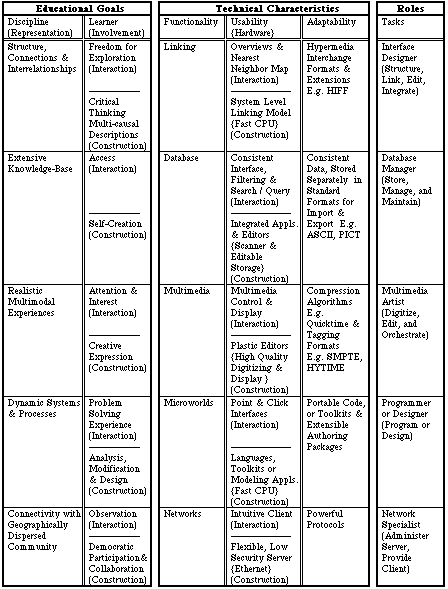resources | hopper, 1995, 1997, 1999
Hopper, M. E. (1995, 1997, 1999). About Education on the Electronic Frontier.
Phase 2 - Late 1990s (1995-2000)
Education on the Electronic Frontier
The expedition to MIT and beyond...
Mary E. Hopper, Ph.D.
Project Director
Owner and Manager, Studio-E, Harvard Sq.
Visting Scientist, Center for Educational Computing Initiatives, MIT
Postdoc, Comparative Media Studies,
Managing Editor, Media-in-Transition Project,
Communications Forum, MIT
_____________________________________________
Education on the E-Frontier
Success in Contexts
_____________________________________________
A report about an ongoing expedition to document
the educational, technical and organizational
contexts of educational e-media projects.
Expedition Question
Are there viable E-Projects?
This phase has involved very little change,
but just more of a sense of dubiousness.
[See previous expedition, CPIAECE.]
Contexts of Education on the E-Frontier

Understanding "educational e-media projects"
can be framed in terms of the educational,
technical and organizational contexts inherent
in the term itself. The success of projects depends
upon managing the factors within these contexts.
A distinct set of themes have emerged during the history of educatioanl media,
while each new wave of innovation produces some reinterpretation or elaboration
of them. These themes fall into three categories that correspond to the three
areas of concern implicit in the term "educational media projects".
Projects are carried out in an educational context, they have used some type
of technology to produce and deliver media, and they have been carried out
within the social and economic structures of the organization in which they
take place. The order in which the issues within the three contexts were
addressed both within individual projects and across the history of projects
tended to evolve in phases from educational to organizational.
Methods
Informal Ethnographic & Documentation
There's been no "official" study-- watching
projects informally and reflecting on my past work.
Projects
I finished my research in 1993, but
in the end, felt terribly hit and run...this really hit home to me once
the summer after my research when I went to visit George Landow and Paul
Kahn at IRIS at Brown as it was closing.. There was this moment when
I remember George talking about other research that had been done there,
and saying to me "at least you came back." That really struck me as something
critical! So I realized mapping and tracking projects as they evolved over
time mattered (i.e. longitudinal).
But Intermedia was gone... so eventually
I began lurking around MIT!
Many projects at MIT viewed as opportunities
to further define the framework of concepts developed in this study.
After all, it was a great place to be..
there were some really big famous projects
here!
In addition, I was particularly fascinated
with why there
were so many advanced e-humanities projects
at MIT?
Then the WWW came along somewhere in between,
Tim Berners-Lee and the WWW Consortium
moved to LCS,
and then MIT became a REALLY good place
to be!
Data Type and Collection
Only thing more painful than detailed ethnographic work--
finding out it had been for little added value!
So I stopped collecting formal interview data,
but I still did informal collection of
documentation of projects.
I found that documents were even very
hard to keep up with...
..like quicksand!
Researcher Role
I came to find myself become increasingly
the ghost of projects past.
Hanging around haunting a bunch of folks
here.
Meeting with people sometimes (not as
much as I wanted).
Going to events a lot!
In reality, saying there was no formal
data collection is misleading.
I've gotten more and better detailed
data here at MIT than I did for my thesis.
The main way I get very detailed data
is to work on a project myself.
Then I can get information at a great
depth and get incredible detail
(sometimes massive amounts it).
The formal term for dealing with
this problem with this approach:
"participant observer"
Particularly since 95, spending time at
CECI and lately in CMS
(also a way to earn a living).
AthenaMuse II Documentation
Networked Multimedia Information Systems
(Bush Symposium)
Shakespeare Archive
Comparative Media Studies/Media-in-Transition
(great stuff on Foreign Language Projects,
Glorianna Davenport's Work Etc.)
Longitudinal and/or Historical Focus
As I mentioned, I consider longitudinal
research critical.
Through doing that informally, a different
question than viability emerged.
In reality, many e-projects arenít necessarily
designed to be viable and survive.
They are established to achieve transient
goals.
To evaluate success, the question is
one of impact rather than survival.
The way to track impact is through relationships
between projects.
By working on the Media in Transition
and watching projects, consider relationships between current e-projects
and their pre-digital ancestor media. Many established e-projects
have had multiple generations, and there is generally a story that goes
back beyond computers. This may be an important way of understanding the
nature of differences between projects from a deeper perspective.
Technology in Data Collection, Analysis and Reporting
HTML/Web Interface
I created an informal growing digital
and analog archive about the "who, what, when, where and why" of Electronic
Projects to manage an expanding set of documents. Eventually,
I found I sometimes shifted from researcher to participant.
It is inadequate for publication-- it is a huge site which has a lot of
things not appropriate to publish mixed with much that would be publicly
viewable.
One objective of this approach was to
deal with the fact projects are dynamic rather than static.
Results (Models)
Anatomy of the Contexts of Projects on the E-Frontier
A Detailed Map



Summary and Discussion
Contexts of Projects on the E-Frontier
The goal of successful projects is to continue
expanding rich educational e-media environments.
The challenge is to maintain balance between the
contexts and manage the relationships among them.
The Model of Projects Generalized
For projects in distributed computing environments,
there was a theme of continuous change and expansion.
They must continue to change in order to survive.
As the web has emerged, the issues in
the projects I studied turned out to reflect what happened on a large scale
when the distributed computing model spread via the WWW.
One of the more interesting things concluded,
due to informal longitudinal study is that it is critical to understand
that projects have a cyclic nature due to a complex interaction of broader
technology cycles and internal funding cycles.
I realize now that I actually just came
in on the down side. We're now entering an up side.
Mature projects have gone through many
generations. The size and scale of the larger and older projects almost
always requires large amounts of all types of resources, so generally they
move to multiple partners, consortiums or other organizational structures
with a variety of types of institutions that each provide their own strengths,
but also come with weaknesses. Managing that is one of the reasons
the projects are so complex.
Dynamic systems are hard to manage and
it isnít surprising that organizational issues abound. It is also
true that when you look back the writings of people like Vannevar Bush,
it is historically well recognized phenomena. (I began to feel better :)
Educational Contexts of Projects on the E-Frontier

"The challenge of the educational context" is to
decide what educational role e-media will play.
Avoid "technology for the sake of technology" by
examining traditional educational experiences
and determining goals based upon the special
"value added of the e-media" for both the
discipline content representation as well
as cognitive and motivational outcomes.
Technical Contexts of Projects on the E-Frontier

Critical issues in the technical contexts of
projects revolve around the characteristics
of the software. The key characteristics
include appropriate functionality, usability
for interaction and creation, as well as
adaptability for availability and the change
inherent in distributed computing systems.
The best approach is to consider all three
types of characteristics BEFORE beginning.
More About Usability
Organizational Contexts of Projects on the E-Frontier

Projects consist of complex electronic environments
that require regular use to survive. Continuation
depends upon establishing a system to obtain resources
for supporting continuous maintenance and delivery.
Organizational Rationale for Learner Construction
The table below provides a summary of all of the different types of
issues which need to be considered.

E-Projects are complex and dynamic
systems, and it is crucial to develop more powerful strategies to understand
them.
Conclusions and Pointers to Next Phase of Expedition
This expedition serves as the beginning of a much larger task.
The key factors within each of the major contexts, and the relationships
among them are defined in a preliminary manner. It is beyond the scope
of a single expedition to provide complete descriptions of the functioning
of "educational e-media projects." A more complete understanding must
be achieved through a systematic and ongoing initiative to make detailed
analysis of a varity of projects and then make comparisons among them.
It is critical to begin treating all past, continuing and new projects
as experiments to be observed and documented. Such an ongoing initiative
will provide a better definition of the framework of concepts introduced here.
[See the overview of the next phase,  .]
.]
© Mary E. Hopper [MEHopper] |
MEHopper@TheWorld.com
[posted 00/00/00 | revised 02/02/02]





